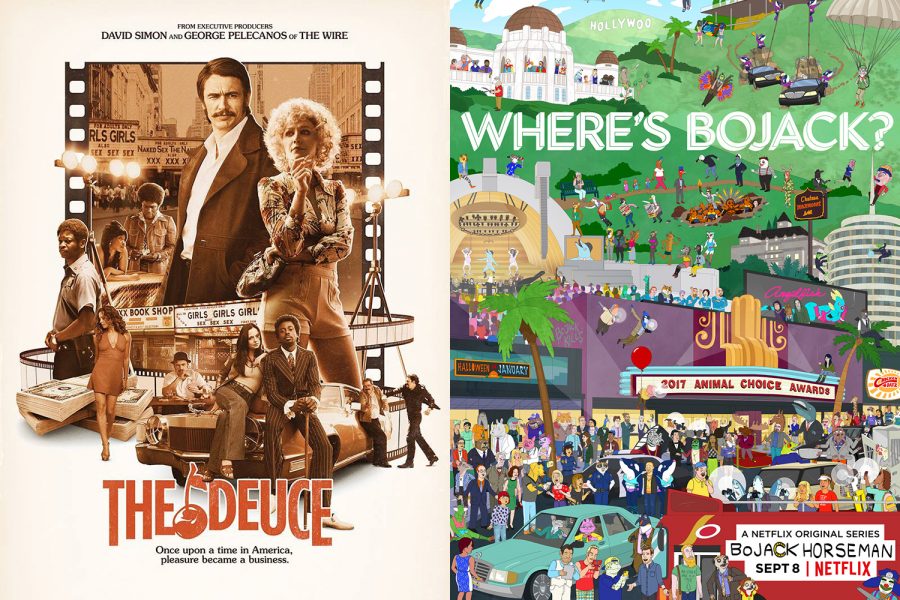Showing darkside of stardom, The Deuce and BoJack Horseman conclude their runs
HBO’s hidden gem The Deuce concluded its tale of New York’s sex industry boom while Netflix’s critically acclaimed animated series BoJack Horseman begins to roll the credits. Both shows are about the dark side of showbiz, from the behind the scenes of pornography films to the ventures of a television has-been.
October 30, 2019
The following review may contain spoilers
This fall, viewers received two farewells from HBO’s realistic depiction of sex workers spanning from the 70s to 80s to Netflix’s sole masterwork about the musings of a washed-up television actor, both depicting the dark side of Hollywood.
The Deuce
After creating what may possibly be labeled as the greatest TV drama of all time with The Wire, writer David Simon ventures into the rise of New York’s sex industry from the 70s to 80s with The Deuce.
Labeled as “Mr. Non-fiction,” due to his past career working as a journalist for the Baltimore Sun, The Deuce continues Simon’s mission to depict a story about the casualties of American society.
In the final season, set in the 80s, outcasts Vincent Martino and his gambling twin Frankie, both played by James Franco, and many New York City misfits are seeing their golden days fade as the AIDs crisis rises, turning certain sex establishments like “bath houses” and “massage parlors” into the targets of public outrage.
Singular compared to Simon’s previous works, The Deuce creates a bleak America once seen in The Wire and Treme, but here we have unique women as the driving force. There’s prostitute turned pornographic film director Candy Renee (standout Maggie Gyllenhaal), feminist Abby Parker (Margarita Levieva), who leaves her privileged lifestyle to aid the victims of the sex trade, and adult-film actress Lori Madison (Emily Meade), a successful porn actress overcoming the trauma of sexual abuse.
The Deuce could be described as the place where everyone aiming for stardom will eventually end up in, where women must make what they have of their talents by pursuing it in a poor version of the medium they’ve yearned.
Viewers don’t come back to the series for the tales of the men who either run the business or try to clean it up, they return because of the women who survive in a man’s world, one that seems to be fading.
BoJack Horseman
Raphael Bob-Waksberg’s BoJack Horseman presents the first half of its final season, and like its previous seasons, it’s tender, human, and humorous.
When Netflix presented its lineup of dramas with House of Cards and Orange is the New Black, neither captured the zeitgeist of HBO’s golden era or of auteur television, but when it came to BoJack Horseman, they made something for the ages.
The dark side of showbiz is displayed in multiple of the character’s storylines. From BoJack’s (voiced by the Emmy-deserving Will Arnett) return from rehab, resulting in helping others with no reward, Diane’s (Alison Brie) news show being restricted from telling stories, or Princess Caroline’s (the always wonderful Amy Sedaris) pursuit to become both a mother and a successful agent.
But Waksburg is now enlisted with ending each of these character’s journeys, something that may not end well judging from the set-up of the eighth episode, but as always, we have the lighthearted and innocent shenanigans of Mr. Peanutbutter to ease it.
The Deuce concludes another David Simon journalistic TV piece, while the human and animal protagonists of BoJack Horseman prepares to wave goodbye. They’re both about showbiz, whether if it’s the journey of a pornographic filmmaker or remorse of a horse actor, Hollywood doesn’t end well for everyone.



